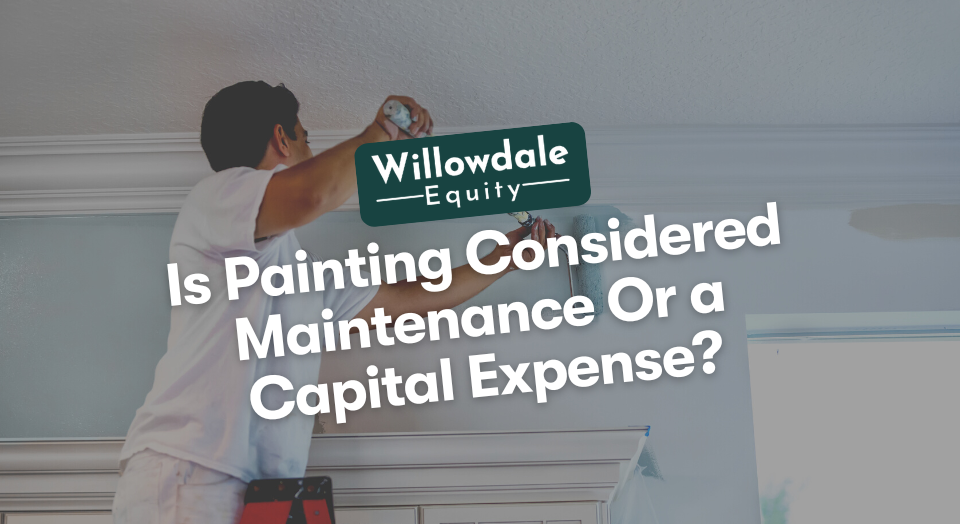
Is Painting Considered Maintenance Or a Capital Expense?
This article is part of our guide on passive investing in multifamily via syndication, available here.
In the business world, you can capitalize painting costs, which has many advantages for a company. A business can save money on taxes by capitalizing these costs so that they can be written off over time. The expense of the painting project may also be stretched over time, making it more affordable.
But, the question remains: is painting considered maintenance or a capital expense? Recently, a lot of individuals have started asking about this topic. People are searching for ways to save money in light of the economy’s current status.
Avoiding unnecessary expenditures is one approach to saving money. So, is painting a capital improvement or just a maintenance expense? We answer this in the article and whether other standard costs related to a property, like a roof replacement and HVAC replacement, are considered maintenance costs or capital expenditures.
Key Takeaways
-
Only expenses anticipated to have a favorable financial impact in the future can be capitalized.
-
Painting houses do not count as capital improvements. Therefore, property owners cannot deduct the expense of painting from their taxes.
Is Painting Considered Maintenance or a Capital Expense?
It’s common to imagine painting your workplace or building as a routine maintenance expense. Costs may, however, be capitalized in specific circumstances, such as when they relate to a new structure or a project for a capital improvement or extension.
You can deduct the cost of having someone paint your entire building from their direct expenditures. You can consider them as deductible repairs. However, it would be better to consult a tax professional before reaching any conclusion.
Only expenses anticipated to have a favorable financial impact in the future can be capitalized. Painting houses do not count as capital improvements. Therefore, property owners cannot deduct the expense of painting from their taxes.
Painting and decorating expenses for an existing structure are frequently deducted from revenue rather than capital expenditures. The expenses must be recorded regardless of whether they were incurred as a major component of a brand-new building structure, existing capital improvements, or an expansion project.
Painting is generally not regarded as a capital expense. It implies that it is ineligible for some tax breaks and allowances offered to enterprises. Another necessary expense to classify is roof replacement. We will do that next.
Good Read: What is the Rent Premium in Commercial Real?
Is a Roof Replacement a Capital Expense?
A company may incur significant costs related to roofing. Whether the expenses can be written off right away as a repair for tax purposes or if they need to be capitalized must be determined.
Surprises do occur. Imagine that a roofing contractor is approached to fix a leak in a roof. Following an inspection, the roofing professionals assess that the leaky spot cannot be repaired and that the entire roof must be rebuilt. A roof replacement, which is now needed, will be classified as a capital investment rather than a repair expense, which would have been a maintenance cost.
In other words, if it is found that a cost has an enduring benefit, it will typically be classified as a capital expense. For instance, due to their long-term benefits, replacing a building’s entire roof or re-bricking are payments that would be considered a capital expense in nature.
With painting costs and roof replacement expenses categorized, it’s time to classify another critical expenditure: HVAC replacement.
Is HVAC Replacement a Capital Expense?
Each year, tax professionals who work with real estate must assess the most recent building investments and decide which costs should be capitalized or written off as repair costs. The HVAC system, which depends on electrical, mechanical, and plumbing systems, is the one system inside a building most impacted by technological advancements.
The estimated life of HVAC parts can be significantly shortened without regular maintenance, necessitating costly repairs. An HVAC invoice should be easy for tax professionals to interpret to assess whether the cost may be written off as a capital expense.
Did the expenses for the HVAC system come from converting an existing building area to a new or different use? If so, it is necessary to capitalize the HVAC costs. For instance, the entire sum, including HVAC costs, would need to be capitalized if the money was used to transform an office building into a restaurant.
We have covered all bases regarding the classification of painting, roof replacement, and HVAC replacement as capital expenses. However, a few frequently asked questions (FAQs) regarding if painting is considered maintenance or capital expense are to be answered. That is what we will be doing next.
Frequently Asked Questions about If Painting is Considered Maintenance or Capital Expense
Yes, you would be eligible to deduct this cost as business expenditure if the HVAC unit was not regarded as capital or leasehold enhancement to the commercial property.
New and used HVAC equipment is now accepted as Section 179 costs by the IRS as of January 1, 2018. Before 2018, HVAC equipment was not eligible for tax deductions since the legislation classified it as a building capital improvement instead of a business cost.
Conclusion
Every time any maintenance, repair, or remodeling is carried out, it is essential to carefully decide if the cost should be classified as maintenance, a capital expense, or an upgrade. To do it right, consider the asset’s value, the work’s planned purpose, the project’s scope, the actual outcome, and how those factors will affect the asset’s worth, depreciation, and equity return.
Sources:
Interested In Learning More About PASSIVE Real Estate Investing In Multifamily Properties?
Get Access to the FREE 5 Day PASSIVE Real Estate Investing Crash Course.
In this video crash course, you’ll learn everything you need to know from A to Z
about passive investing in multifamily real estate.
We’ll cover topics like earned income vs passive income, the tax advantages, why multifamily, inflation, how syndications work, and much much more!




